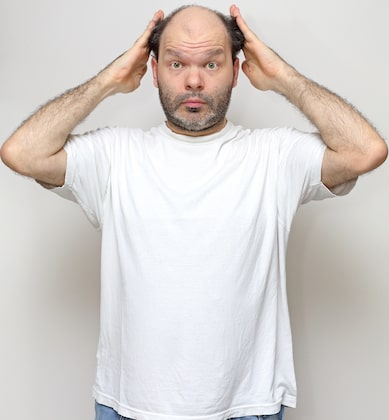Poor Diet and Hair Loss – See the Connection
A person who follows an unhealthy diet can experience conditions such as weight gain, high blood pressure, and other health issues. There is another side effect of a poor diet that is often not discussed and that is the loss of hair on the scalp. Hair loss can happen to both males and females and also cause the person to suffer from poor self-esteem and reduced self-confidence. Why role does a poor diet play in the development of hair loss? The answer will be revealed in the article below.
Poor Diet – Why it Can Cause Hair Loss
 Before discussing the connection between a poor diet and hair loss, it is important to remember that it is not the only reason for the loss of hair on the scalp. Other common reasons for hair loss include genetics, an infection, certain medications, hormone imbalance, and sudden stress.
Before discussing the connection between a poor diet and hair loss, it is important to remember that it is not the only reason for the loss of hair on the scalp. Other common reasons for hair loss include genetics, an infection, certain medications, hormone imbalance, and sudden stress.
When it comes to the diet of a person and hair loss, poor nutrition choices made by a person can result in the loss of hair on the scalp. One of the reasons a poor diet can result in hair loss is that the hair might not be able to receive the amount of nutrition that is necessary for it to grow and maintain thickness on the scalp. Thankfully, some simple changes in the diet of a person can often have a positive impact on the overall health and appearance of their hair. One of the steps that can be taken by a person is to address the deficiencies in their diet that is promoting the loss of hair. Some of the healthy items that should be part of a daily diet that helps hair remain thick and healthy include zinc, biotin, magnesium, zinc, and vitamins A, B, C, and E. It is not guaranteed that the addition of theses items will stop or reverse the hair loss, but they should be part of a daily healthy diet.
Poor Diet – Nutrients to Take to Prevent Hair Loss
There are other nutrients that are an important part of helping the hair of a person to grow while also enjoying a healthy lifespan. Here are some of the nutrients that should be included as part of a daily diet of a person who wants to have a healthy head of hair:
- Omega-3 fatty acids have the ability to nourish the hair and promote hair growth on a consistent basis along with a silky look and shine. Common foods that contain good amounts of these fatty acids include chia seeds, salmon, walnuts, and soybeans.
- Folic acid in citrus fruits and tomatoes work to maintain a healthy and thick head of hair.
- Vitamin D can keep many parts of the body healthy, and this includes the hair on the scalp. Past studies have shown a vitamin D deficiency can contribute to hair loss so patients should get plenty of vitamin D through milk, egg yolks, and fatty fish.
- Vitamin B creates red blood cells that carry oxygen and nutrients to the scalp as well as the hair follicles. Some food options that contain vitamin B include potatoes and bananas which contain vitamin B6 while meat and dairy products contain vitamin B12.
- Some of the other nutrients that should be included in a healthy diet include protein and iron. Protein is very important as the hair will not be able to remain healthy without items that contain protein such as fish, meat, chicken, and eggs. Proteins can also be found in nuts, plants, potatoes, gains, and lentils. On the other hand, iron can be found in many common breads and cereals.
Poor Diet = Hair Transplant Option
Once a poor diet leads to a loss of hair on the scalp, the effect of the hair loss might be too advanced for a person to reverse the amount of thinning or bald spots by changing their diet. If a person is not able to make changes by updating and improving their diet, they can schedule a consultation appointment with a board-certified hair transplant surgeon. The doctor will examine the scalp to determine the extent of the hair loss the person is experiencing. The surgeon will also examine the person to identify the cause of the hair loss.
If the loss of hair on the scalp is due to a poor diet on the part of the patient, the doctor can decide if a change in diet will be enough to reverse any of the hair loss. If not, the surgeon can explain the hair transplant process to the person in order to give the patient a full picture about the changes that can be gained to the look of the scalp through hair restoration. A loss of hair from a poor diet does not have to be permanent, which is why it is important to visit a doctor who is trained and board-certified in treating hair loss.